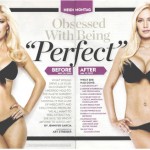The August issue of Social History of Medicine contains eight original articles: Late 19th/early 20th century food adulteration in an increasingly industrialized and globalized world and the search for safety standards The shift in cancer education in the 1950s, no longer downplaying post-operative recovery The 20th century shift in British veterinary medicine towards small animals… Read more
Search Results for: self-help
A new blog on the self
I’ve started another blog called Basic research on the self. My intention is to write there about the social and cultural history of the self, aided by insights from sociology, anthropology, philosophy and psychology (especially critical psychology). This is a subject that relates to a number of topics I’ve written about here. A while back… Read more
Healthy lifestyles: The unfortunate consequences
 Collectively, increased health consciousness was followed by increased health care costs. The promotion of healthy lifestyles was not the only reason health consciousness increased in the late 20th century. And there were, of course, many other forces at work that increased the costs of health care. But it seems fair to say that the new perspective on health ended up providing opportunities to expand the demand for more medical services. Any hope that individual responsibility for healthy lifestyles would reduce costs – still touted today by some politicians and health care economists — turned out to be a mirage. Read more
Collectively, increased health consciousness was followed by increased health care costs. The promotion of healthy lifestyles was not the only reason health consciousness increased in the late 20th century. And there were, of course, many other forces at work that increased the costs of health care. But it seems fair to say that the new perspective on health ended up providing opportunities to expand the demand for more medical services. Any hope that individual responsibility for healthy lifestyles would reduce costs – still touted today by some politicians and health care economists — turned out to be a mirage. Read more
On healthism, the social determinants of health, conformity, & embracing the abnormal: (3) Connections
 ~ Conformity and corporatism: Surgically altering one’s appearance (e.g., designer feet) presumably increases one’s chance of success in a society that commodifies bodies (i.e., in a society where salary, career advancement, social status and marriage prospects are influenced by appearance). Altering one’s personality with psychopharmaceuticals allows one to project the qualities necessary for success in a highly competitive society. Read more
~ Conformity and corporatism: Surgically altering one’s appearance (e.g., designer feet) presumably increases one’s chance of success in a society that commodifies bodies (i.e., in a society where salary, career advancement, social status and marriage prospects are influenced by appearance). Altering one’s personality with psychopharmaceuticals allows one to project the qualities necessary for success in a highly competitive society. Read more
On healthism, the social determinants of health, conformity, & embracing the abnormal: (1) Bodies, minds & medicine
 It’s always hard to be sure about these things, but I think the reason I decided to take a ‘sabbatical’ from blogging last July was that I was interested in too many seemingly unrelated topics. Writing about all of them left me feeling like I never got to the ‘meat’ of any one of them. And I couldn’t convince myself to focus on just one or two things, since that would mean abandoning the others, which I was unwilling to do. Read more
It’s always hard to be sure about these things, but I think the reason I decided to take a ‘sabbatical’ from blogging last July was that I was interested in too many seemingly unrelated topics. Writing about all of them left me feeling like I never got to the ‘meat’ of any one of them. And I couldn’t convince myself to focus on just one or two things, since that would mean abandoning the others, which I was unwilling to do. Read more
What is healthism? (part one)
 Throughout history there’s been an understandable desire to find connections between our behavior and our health. Human beings have practiced health regimens involving diet, exercise and hygiene since antiquity. When medicine was based on the humoral theory of disease, for example, individuals were advised to purge the body in the spring and, in the summer, avoid foods or activities that caused heat. Bathing in ice water was recommended in the 19th century. Mark Twain quoted the advice: “the only way to keep your health is to eat what you don’t want, drink what you don’t like, and do what you’d druther not.” Read more
Throughout history there’s been an understandable desire to find connections between our behavior and our health. Human beings have practiced health regimens involving diet, exercise and hygiene since antiquity. When medicine was based on the humoral theory of disease, for example, individuals were advised to purge the body in the spring and, in the summer, avoid foods or activities that caused heat. Bathing in ice water was recommended in the 19th century. Mark Twain quoted the advice: “the only way to keep your health is to eat what you don’t want, drink what you don’t like, and do what you’d druther not.” Read more
When the poor were contagious
 Will the London riots raise questions about a world that doesn’t care about the socially disadvantaged? Questions, yes. But will that be enough to bring about a change in attitudes and policies? Probably not. Unfortunately, the situation will need to get much worse. Even when that happens, current financial interests are likely to prevail. A discouraging prospect, yes, but a struggle worth waging. Read more
Will the London riots raise questions about a world that doesn’t care about the socially disadvantaged? Questions, yes. But will that be enough to bring about a change in attitudes and policies? Probably not. Unfortunately, the situation will need to get much worse. Even when that happens, current financial interests are likely to prevail. A discouraging prospect, yes, but a struggle worth waging. Read more
Why do we feel bad about the way we look?
 How did ordinary women and men with ordinary lives and ordinary bodies learn that they need plastic? The answer: the plastic ideological complex, a set of cultural texts that are both highly contested and yet tightly on message. It is itself so ubiquitous that it might even be described as hegemonic. In other words, the “need” for cosmetic procedures is impossible to avoid. Through advertising and TV shows, movies and magazines, we learn to want cosmetic intervention in our aging faces and imperfect bodies. This need is now so firmly implanted in our cultural psyche that it has become “common sense” to embrace cosmetic procedures. Read more
How did ordinary women and men with ordinary lives and ordinary bodies learn that they need plastic? The answer: the plastic ideological complex, a set of cultural texts that are both highly contested and yet tightly on message. It is itself so ubiquitous that it might even be described as hegemonic. In other words, the “need” for cosmetic procedures is impossible to avoid. Through advertising and TV shows, movies and magazines, we learn to want cosmetic intervention in our aging faces and imperfect bodies. This need is now so firmly implanted in our cultural psyche that it has become “common sense” to embrace cosmetic procedures. Read more
The duty to be happy
 By the duty to be happy, I thus refer to the ideology peculiar to the second half of the twentieth century that urges us to evaluate everything in terms of pleasure and displeasure, a summons to a euphoria that makes those who do not respond to it ashamed or uneasy. A dual postulate: on the one hand, we have to make the most of our lives; on the other, we have to be sorry and punish ourselves if we don’t succeed in doing so. This is a perversion of a very beautiful idea: that everyone has a right to control his own destiny and to improve his life. How did a liberating principle of the enlightenment, the right to happiness, get transformed into a dogma, a collective catechism? Read more
By the duty to be happy, I thus refer to the ideology peculiar to the second half of the twentieth century that urges us to evaluate everything in terms of pleasure and displeasure, a summons to a euphoria that makes those who do not respond to it ashamed or uneasy. A dual postulate: on the one hand, we have to make the most of our lives; on the other, we have to be sorry and punish ourselves if we don’t succeed in doing so. This is a perversion of a very beautiful idea: that everyone has a right to control his own destiny and to improve his life. How did a liberating principle of the enlightenment, the right to happiness, get transformed into a dogma, a collective catechism? Read more
The ethics of a neuroenhanced future
 Pharmaceuticals … are now being consumed at high rates as off-label “cognitive enhancers” to boost mood, memory, and alertness. … What will happen to the fabric of society and the character of our interactions with one another? Are these altered states a genuine reflection of a new and improved “me” or “we”, or some transient drug-induced condition that thoroughly confounds what we inherently value? Will we be coerced into conforming to a wave of drug intervention in the ever expanding, do-it-yourself, self-help world? Read more
Pharmaceuticals … are now being consumed at high rates as off-label “cognitive enhancers” to boost mood, memory, and alertness. … What will happen to the fabric of society and the character of our interactions with one another? Are these altered states a genuine reflection of a new and improved “me” or “we”, or some transient drug-induced condition that thoroughly confounds what we inherently value? Will we be coerced into conforming to a wave of drug intervention in the ever expanding, do-it-yourself, self-help world? Read more
The problem is you
 Any theory that claims to tell us who and what we are contains a potential for abuse. Advice from “legitimate” sources, addressing itself to areas of human weakness and vulnerability, can deprive an individual of the confidence that he could know for himself who he should be. Religion used to have this potential on a wide scale when the population was less educated, less self-conscious, less “sophisticated.” Organized religion still has the advantage of being able to hide behind a veil of crossed intentions and a choirboy squeaky-clean. But any closed system of thought can gain ascendancy using perfected psychological, that is, commercial, techniques. Read more
Any theory that claims to tell us who and what we are contains a potential for abuse. Advice from “legitimate” sources, addressing itself to areas of human weakness and vulnerability, can deprive an individual of the confidence that he could know for himself who he should be. Religion used to have this potential on a wide scale when the population was less educated, less self-conscious, less “sophisticated.” Organized religion still has the advantage of being able to hide behind a veil of crossed intentions and a choirboy squeaky-clean. But any closed system of thought can gain ascendancy using perfected psychological, that is, commercial, techniques. Read more
Obesity: Moving beyond willpower vs. the food-industrial complex
Source: The Pilver Marc Ambinder has written a terrific article on obesity for The Atlantic. It’s comprehensive and insightful, both objective and personal. Ambinder himself suffered from obesity until a year ago, when he went from 235 to 150 pounds following bariatric surgery. The operation immediately improved his severe diabetes, and within months it relieved… Read more
Why it’s safe to completely ignore Dr. Mercola
Source: Kitchen Table Medicine A chiropractor for whom I have considerable respect – she’s a scientist, formerly an aeronautical engineer – is handing out copies of an article by Dr. Mercola that recommends against the swine flu vaccine. Another chiropractor told me she knew of no one in her profession who would receive, or allow… Read more
Real men don’t use doctors
Source: Defending the truth Too much machismo can be bad for a man’s health. A recent study finds that the John Wayne/Sylvester Stallone types are half as likely as their less “macho” counterparts to visit a doctor for preventive health care. The study was presented at the annual meeting of the American Sociological Association on… Read more
My personal odyssey through the health culture
I was a “victim of advice” in the seventies, but I should have known better. Read more
The Health Culture: Yesterday. Today. Tomorrow.
The incessant injunction to adopt “healthy lifestyles” may not be in our best interest, either as individuals or as a society. Read more


